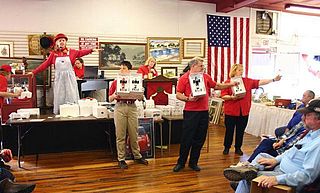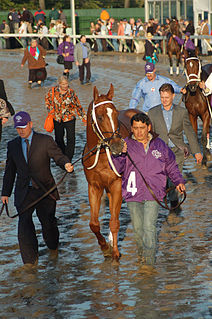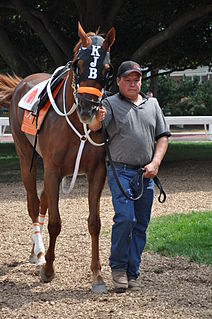| Count Ricardo | |
|---|---|
| Sire | Principality |
| Grandsire | Victory Prince (AUS) |
| Dam | Shanghai Surprise |
| Damsire | Imperial Prince (IRE) |
| Sex | Gelding |
| Foaled | 18 August 2001 |
| Country | Australia |
| Colour | Chestnut |
| Breeder | M. Ralston, L.J. Theodore |
| Owner | P. Damjanovic, S.J. Damjanovic, S.J. Theodore, W.W. Burrell, S.B. Crawford |
| Trainer | Stephen Theodore |
| Record | 23: 3-2-4 |
| Earnings | $543,460 |
| Major wins | |
| 2004 MRC Sandown Classic | |
| Last updated on 29 August 2011 | |
Count Ricardo is an Australian Thoroughbred racehorse gelding who is best known as a bargain purchase from an auction sale. He was foaled on 18 August 2001 and bred by M Ralston, L J Theodore of Victoria. Count Ricardo was a chestnut colt by the unfashionable stallion Principality from Shanghai Surprise (dam of Surprise Pick) by the staying influence Imperial Prince (IRE).

Australia, officially the Commonwealth of Australia, is a sovereign country comprising the mainland of the Australian continent, the island of Tasmania and numerous smaller islands. It is the largest country in Oceania and the world's sixth-largest country by total area. The neighbouring countries are Papua New Guinea, Indonesia and East Timor to the north; the Solomon Islands and Vanuatu to the north-east; and New Zealand to the south-east. The population of 25 million is highly urbanised and heavily concentrated on the eastern seaboard. Australia's capital is Canberra, and its largest city is Sydney. The country's other major metropolitan areas are Melbourne, Brisbane, Perth and Adelaide.

The Thoroughbred is a horse breed best known for its use in horse racing. Although the word thoroughbred is sometimes used to refer to any breed of purebred horse, it technically refers only to the Thoroughbred breed. Thoroughbreds are considered "hot-blooded" horses that are known for their agility, speed, and spirit.

An auction is a process of buying and selling goods or services by offering them up for bid, taking bids, and then selling the item to the highest bidder. The open ascending price auction is arguably the most common form of auction in use today. Participants bid openly against one another, with each subsequent bid required to be higher than the previous bid. An auctioneer may announce prices, bidders may call out their bids themselves, or bids may be submitted electronically with the highest current bid publicly displayed. In a Dutch auction, the auctioneer begins with a high asking price for some quantity of like items; the price is lowered until a participant is willing to accept the auctioneer's price for some quantity of the goods in the lot or until the seller's reserve price is met. While auctions are most associated in the public imagination with the sale of antiques, paintings, rare collectibles and expensive wines, auctions are also used for commodities, livestock, radio spectrum and used cars. In economic theory, an auction may refer to any mechanism or set of trading rules for exchange.
His trainer and co-owner Stephen Theodore purchased him for just A$880 (including GST), who kept a half share and sold half.
Count Ricardo won his debut in a two-year-old race at Mornington, earning $7,150. During 2004, he won two more races including the Group Two Sandown Classic. Prior to the Group One Victoria Derby, Theodore decided to sell 15 per cent of his half-share for a reported $75,000 to part owners P. & S. Damjanovic, W. Burrell & S Crawford. Count Ricardo ran third in the Victoria Derby, 1.4 lengths behind the winner, Plastered. [1]
Group One, Group 1, Grade I or G1 is the term used for the highest level of Thoroughbred and Standardbred stakes races in many countries. In Europe, the level of races for Thoroughbred racing is determined using the Pattern race system introduced in 1971 and monitored by the European Pattern Committee. To attain or maintain a Group One status, the average rating for the first four finishers in the race must be 115 or higher over a three year period. The International Federation of Horseracing Authorities works to ensure consistent international standards. Group One races may only be restricted to age groups or a stipulated sex: they should not be restricted to horses bred in a certain country. Group One (G1) races may be run under handicap conditions in Australia, but in Europe weight-for-age conditions always apply.

The Victoria Derby, also known as the AAMI Victoria Derby, is a Victoria Racing Club Group 1 Thoroughbred horse race for three-year-olds held under Set Weights conditions over a distance of 2,500 metres at Flemington Racecourse, Melbourne, Australia scheduled annually on the first day of the Melbourne Cup Carnival, AAMI Victoria Derby Day. Total prize money for the race is A$2,000,000.
He raced without any further successes in 2005, 2006 and 2008. [2]
During his racing career, he started 23 times for three wins, two seconds and four thirds with prizemoney of A$543,460 - 600 times his original sale price. [3]










